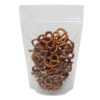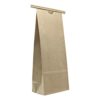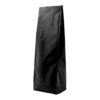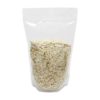Blog
Choosing the Right Food Storage Bags
Food safety and hygiene are paramount when it comes to protecting your health and ensuring the freshness of your meals. Whether you’re a home cook, a restaurant owner, or a food enthusiast, proper food storage is a critical element of this. In this blog post, we’ll delve into the importance of food safety and hygiene in food storage, exploring the various types of food storage bags, such as vacuum-sealed, zipper-lock, and resealable bags, and their suitability for different food items. We will also provide practical tips for proper food storage practices to keep your meals fresh and safe. Let’s begin by understanding why food safety is so crucial.
The Importance of Food Safety and Hygiene
Food safety is a fundamental aspect of maintaining the quality and safety of the food we consume. It involves the handling, preparation, and storage of food to prevent contamination and the growth of harmful microorganisms. The consequences of neglecting food safety can be severe, leading to foodborne illnesses, spoilage, and unnecessary food waste. Food safety is essential for both health and economic reasons. Here are a few key reasons why food safety matters:
Prevents Foodborne Illnesses
Proper food safety measures reduce the risk of foodborne illnesses, which can range from mild stomach discomfort to severe health complications. Ensuring that food is stored correctly is a vital part of this process.
Reduces Food Waste
Proper food storage helps extend the shelf life of food, reducing the amount of food that ends up in the trash. It’s an economic and ecological win-win.
Maintains Food Quality
Quality is key when it comes to food. Proper storage helps maintain the flavor, texture, and nutritional value of your meals, ensuring they taste as good as they should.
Meets Regulatory Standards
For restaurants and food businesses, adhering to food safety regulations is essential to avoid legal repercussions and protect their reputation.
The Role of Food Storage Bags
Food storage bags are essential tools for preserving the quality and safety of your food. They come in various types, each designed for specific purposes. Let’s explore the most common types of food storage bags and their suitability for different food items.
Vacuum-Sealed Bags
Vacuum-sealed bags are airtight and designed to remove air from the bag before sealing, creating a vacuum that preserves the freshness of the food. These bags are excellent for extended storage periods and are ideal for both raw and cooked foods. Here’s when you should use vacuum-sealed bags:
Meat and Poultry: Vacuum-sealed bags are perfect for storing raw meat and poultry, preventing freezer burn and extending the shelf life.
Vegetables: Seal vegetables to keep them fresh and prevent freezer burn, which can affect their texture and taste.
Soups and Sauces: Store soups, sauces, and stews in vacuum-sealed bags to maintain their flavors and prevent leaks.
Zipper-Lock Bags
Zipper-lock bags are a versatile option for short-term storage, and they are resealable, making them easy to open and close. These bags are not completely airtight, so they are best suited for items that won’t be stored for an extended period. Here’s when to use zipper-lock bags:
Leftovers: Store leftovers in zipper-lock bags for a few days in the refrigerator, making sure to remove excess air to maintain freshness.
Snacks: Use these bags to portion out snacks or small servings of food.
Dry Ingredients: Store dry ingredients like flour, sugar, and spices in zipper-lock bags, ensuring they are tightly sealed to prevent moisture from getting in.
Resealable Bags
Resealable bags are a reliable choice for short-term storage, similar to zipper-lock bags. They are particularly handy for storing small quantities of food. When to use resealable bags:
Fruits and Vegetables: Keep sliced fruits and vegetables fresh by storing them in resealable bags with excess air removed.
Nuts and Seeds: Portion out nuts and seeds in these bags to prevent them from becoming stale.
Baked Goods: Store cookies, biscuits, and other baked goods in resealable bags to maintain their texture and flavor.
Tips for Proper Food Storage Practices
Proper food storage practices are essential for maintaining food safety and quality. Here are some valuable tips to help you make the most of your food storage bags:
Label and Date: Always label your food storage bags with the contents and date of storage. This makes it easy to identify what’s inside and when it was stored, ensuring you use items before they spoil.
Remove Excess Air: When using zipper-lock or resealable bags, try to remove as much air as possible before sealing to prevent freezer burn and maintain freshness.
Keep It Dry: Ensure that the food you store in bags is dry before sealing. Moisture can lead to mold and spoilage.
Use the Right Bag: Choose the appropriate type of food storage bag for your needs. For long-term storage, opt for vacuum-sealed bags, and for short-term storage, use zipper-lock or resealable bags.
Properly Prepare Food: Before storing, make sure food is clean, properly cooked, and at the right temperature. Avoid storing hot food in bags; let it cool first.
FIFO (First In, First Out): Organize your food items in the freezer or refrigerator with the oldest items at the front. This practice helps prevent food from going bad before you have a chance to use it.
Keep It Tightly Sealed: Ensure that the bag is securely sealed to maintain the integrity of the food inside and to prevent contamination.
Food safety and hygiene are essential aspects of our daily lives, ensuring we enjoy safe and high-quality meals. Proper food storage, facilitated by various types of food storage bags, plays a crucial role in maintaining food safety. Vacuum-sealed bags, zipper-lock bags, and resealable bags offer versatile options for different storage needs.
By understanding the suitable uses for each type of bag and implementing proper food storage practices, you can protect your health, reduce food waste, and make the most of your culinary creations. Food storage bags are not just containers; they are your allies in the journey of safe, delicious, and efficient food management. Make sure to prioritize food safety and use the right food storage bags to keep your meals fresh and wholesome.





